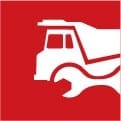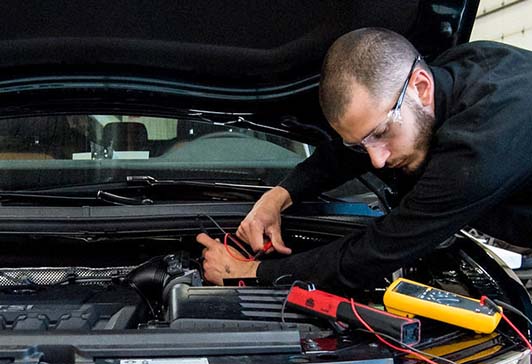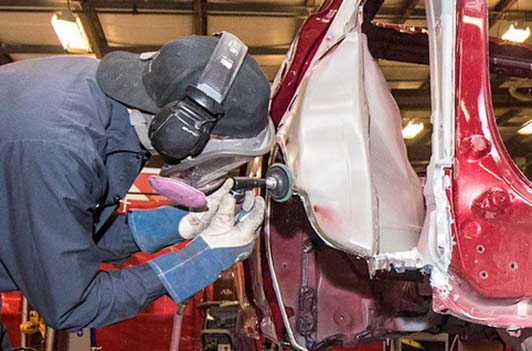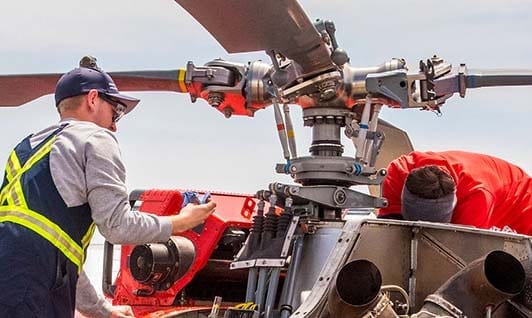Heavy Vehicle Technology
What is heavy vehicle technology?
Heavy Equipment Technicians maintain, repair, and overhaul heavy vehicles and industrial equipment, such as:
- Internal combustion engines and components, both stationary and mobile.
- Tracked equipment, commonly called crawler tractors.
- Ground-engaging equipment and components, including rippers, ditchers, backhoes, trenchers, and similar equipment.
- Towed earth-moving equipment, commonly called scrapers.
- Self-propelled earth moving equipment, commonly called motor scrapers.
- Rubber-tired equipment, commonly called tractors.
- On-highway and off-highway motor vehicles, commonly called trucks.
- Towed on-highway and off-highway vehicles, commonly called trailers.
In general, Heavy Equipment Technicians are employed by specialized repair shops and organizations that own or lease heavy equipment used in the construction, mining, forestry, material handling, landscaping, land clearing, agriculture, and transportation industries. Heavy Equipment Technicians must interpret work orders and technical manuals, write service reports, keep equipment cleaned, lubricated, and maintained, diagnose faults or malfunctions, adjust equipment and repair or replace defective parts, components, or systems, test repaired equipment for proper performance, and ensure that the work done meets manufacturers’ specifications and legislated regulations.
Heavy-duty equipment mechanics perform some or all of the following duties:
- Check bulldozers, cranes, graders and other heavy construction, agricultural, logging and mining equipment for proper performance and inspect equipment to detect faults and malfunctions
- Diagnose faults or malfunctions using computerized and other testing equipment to determine extent of repair required
- Adjust equipment and repair or replace defective parts, components or systems, using hand and power tools
- Test repaired equipment for proper performance and to ensure that work meets manufacturers’ specifications
- Clean, lubricate and perform other routine maintenance work on equipment
- Service attachments and working tools such as harvesting and tillage equipment, blades, ploughs, winches and side booms
- May perform repair work on heavy trucks
- May attach components and adjust new farm equipment.
HOW TO JOIN THE FIELD
Completion of secondary school is usually required.
Completion of a three- to five-year apprenticeship program or a combination of over four years of work experience in the trade and some high school, college or industry courses in heavy equipment repair is usually required to be eligible for trade certification.
Heavy-duty equipment mechanic trade certification is compulsory in Quebec and Alberta and available, but voluntary, in all other provinces and the territories.
Farm equipment mechanic trade certification is available, but voluntary, in Newfoundland and Labrador, Prince Edward Island, Nova Scotia, New Brunswick, Ontario, Manitoba, Saskatchewan, Alberta and British Columbia.
Interprovincial trade certification (Red Seal) is also available to qualified heavy-duty equipment technicians and farm equipment mechanics.
INDIGENOUS AND REMOTE CONSIDERATIONS
Many Indigenous and remote communities have mechanical knowledge, particularly when it comes to machines used to hunt. This enables people to fix machines in order to continue traditional hunting and gathering activities that sustain life. However, there may be less access to formal training on mechanical knowledge. Many fly-in communities do not have access to the types of equipment and workplace technology learn the ropes in this career. Students from these communities may need to relocate to get their education and training and may also need to travel to job sites once they get a career. However, mechanical knowledge is a highly desirable skill when it comes to life in remote communities where access to replacement parts and equipment is more limited than in other parts of the country. In communities with close proximities to mines or access to work in the mining industry, apprenticeships and on-the-job training may be available.
Indigenous and remote communities are catching up to southern Canada when it comes to digital technology and computer skills and industries. Not all communities have access to reliable, affordable internet and service interruptions are all too common. Access to computers at home is not a given for everyone and Elders and even sometimes younger generations lack computer knowledge, although this situation is undergoing some significant changes at the moment. But even those people in Indigenous and remote communities with interest and high-level skills in computers may not have the same access to opportunities to learn about different programs and may face significant bandwidth issues, limiting their ability to learn and develop in this field. Indigenous and remote students may need qualifying courses or need to augment college learning to be successful in this field.
Although with significant improvements currently underway to internet connections in Indigenous and remote communities, careers in this field become more viable and are likely to become more so in years to come.
DISABILITY CONSIDERATIONS
As this field involves both complex thinking and analysis as well as physical operation, people with physical, intellectual and learning disabilities may need accommodations in order to be successful.
Find the right career path for you with our interactive map!
Trouvez le cheminement de carrière qui vous convient grâce à notre carte interactive!
Sample Job Titles
- Construction equipment mechanic
- Diesel mechanic
- Farm equipment mechanic
- Mining mechanic
Companies and Sectors
- Construction sites
- Industrial sites
- Modern laboratories
- Independent shop
- Mines

Heavy Vehicle Technology and the Skills for Success Program
The key Skills for Success for this career path are:
- Reading
- Problem Solving
- Communication




